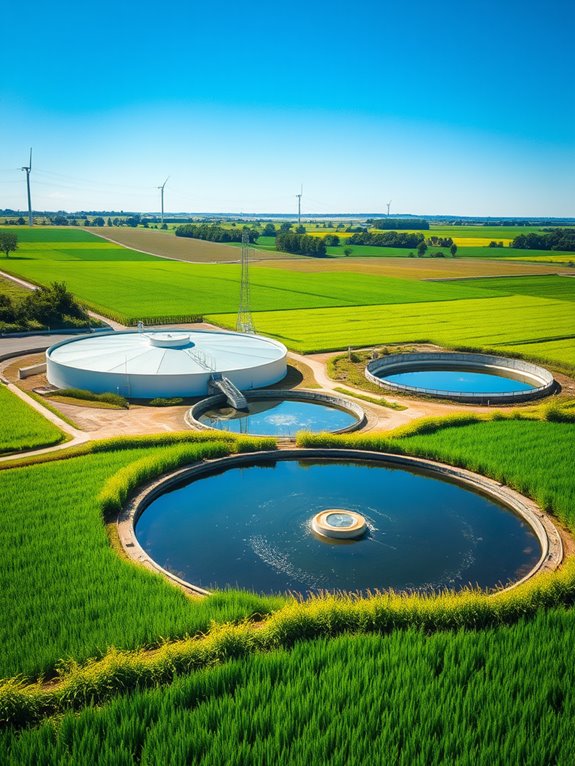You can manage agricultural wastewater effectively by using techniques like biological treatment, constructed wetlands, and membrane filtration. Implementing best practices, such as crop rotation, cover cropping, and nutrient management, also helps reduce pollution and improve soil health. These methods not only enhance water quality but also provide essential nutrients to crops, cutting down on costs for farmers. Learn how innovative technologies and successful case studies are transforming wastewater treatment in agriculture for even better outcomes.
Understanding Agricultural Wastewater Sources

When you consider agricultural practices, it’s crucial to recognize that various activities generate wastewater, impacting both the environment and water resources.
Livestock operations, for instance, produce manure, which can contaminate nearby water sources if not managed properly. Crop production, too, contributes through runoff containing fertilizers and pesticides.
Irrigation practices can lead to waterlogging, causing excess water to flow away, carrying contaminants. Additionally, food processing activities create wastewater filled with organic matter and chemicals.
There’s more to explore! Here’s another valuable read: How to Plumb a Pot Filler: Step-by-Step Guide for DIY Success
Impact of Agricultural Wastewater on Water Quality
Agricultural wastewater greatly affects water quality, posing risks to both ecosystems and human health. It can introduce harmful pollutants, leading to contamination of rivers, lakes, and groundwater. You might notice increased nutrient levels, which cause algal blooms, depleting oxygen and harming aquatic life.
| Pollutant Type | Impact on Water Quality |
|---|---|
| Nutrients | Algal blooms, oxygen depletion |
| Pesticides | Toxicity to aquatic organisms |
| Heavy metals | Bioaccumulation in food chains |
| Pathogens | Waterborne diseases |
Understanding these impacts is essential for ensuring safer water sources.
Treatment Techniques for Agricultural Wastewater

Addressing the challenges posed by agricultural wastewater requires effective treatment techniques to mitigate its impact on water quality.
You can use several methods, such as biological treatment, where microorganisms break down organic matter, or constructed wetlands, which naturally filter pollutants.
Chemical treatments, like coagulation and flocculation, help remove suspended solids and nutrients.
Additionally, membrane filtration can effectively separate contaminants from water.
Each technique has its benefits and limitations, so it’s crucial to assess your specific situation.
Best Management Practices in Agriculture
Implementing best management practices (BMPs) in agriculture can greatly enhance sustainability and reduce environmental impacts. By adopting BMPs, you can improve water quality, minimize runoff, and optimize resource use. Here’s a quick overview of effective practices:
| Practice | Benefits | Implementation Tips |
|---|---|---|
| Crop Rotation | Enhances soil health | Rotate crops annually |
| Buffer Strips | Reduces erosion | Plant vegetation along edges |
| Cover Cropping | Improves soil moisture | Use legumes or grasses |
| Integrated Pest Management | Reduces chemical use | Monitor pests regularly |
| Nutrient Management | Prevents over-fertilization | Test soil and apply as needed |
Innovative Technologies for Wastewater Treatment

As you explore innovative technologies for wastewater treatment, you’ll find that advancements in this field are transforming how we manage agricultural runoff and waste.
Techniques like constructed wetlands utilize natural processes to filter contaminants, while membrane bioreactors offer effective filtration at a smaller footprint.
Additionally, anaerobic digestion not only treats wastewater but also produces biogas, providing renewable energy.
Smart sensors and IoT applications enhance monitoring and optimize treatment processes, ensuring efficiency.
Regulatory Framework and Compliance
When it comes to managing agricultural wastewater, understanding the regulatory framework is essential.
You’ll need to navigate key regulatory agencies and familiarize yourself with compliance standards to avoid penalties.
Staying informed about enforcement measures can help you maintain compliance and protect your operations.
Key Regulatory Agencies
Understanding the key regulatory agencies involved in agricultural wastewater management is essential for ensuring compliance and sustainability.
The Environmental Protection Agency (EPA) plays a vital role in setting national standards and regulations. Your state’s environmental agency often enforces these standards, ensuring local adherence.
Additionally, the U.S. Department of Agriculture (USDA) offers support and funding for sustainable practices. Local agencies might also have specific requirements tailored to regional conditions.
Staying informed about these agencies and their guidelines will help you navigate the regulatory landscape effectively, promoting cleaner water practices while avoiding potential fines or penalties for non-compliance.
Compliance Standards Overview
Steering compliance standards in agricultural wastewater management is vital for aligning with regulatory frameworks. You need to understand that these standards are designed to safeguard water quality and public health.
Familiarize yourself with local, state, and federal regulations, as they often set limits on pollutants and dictate treatment methods. Establishing best practices for wastewater treatment won’t only help you meet these standards but also enhance your operation’s sustainability.
Regular monitoring and reporting are important, ensuring you stay compliant while minimizing environmental impacts. By prioritizing compliance, you contribute to cleaner water and a healthier ecosystem for everyone.
Enforcement and Penalties
While complying with agricultural wastewater regulations is essential, you must also be aware of the enforcement mechanisms and penalties that come into play if standards aren’t met. Understanding these can help you avoid significant issues.
Here are key points to reflect on:
- Fines: Non-compliance can lead to hefty monetary penalties.
- Permits: Revocation of permits may occur for serious violations.
- Legal Action: Regulatory bodies may pursue legal action against repeat offenders.
- Reputation: Non-compliance can tarnish your reputation, impacting business relationships.
Staying informed about these consequences can guide your efforts toward successful compliance and sustainable practices.
Case Studies of Successful Wastewater Management

Now, let’s explore some exciting case studies that showcase innovative filtration techniques and integrated treatment systems in agricultural wastewater management.
You’ll see how these approaches not only improve water quality but also lead to successful crop irrigation.
Innovative Filtration Techniques
As agricultural practices evolve, innovative filtration techniques are proving essential for effective wastewater management.
You can enhance water quality and promote sustainability by adopting these methods:
- Membrane Filtration: Separates contaminants using semi-permeable membranes, ensuring cleaner water.
- Sand Filtration: Utilizes layers of sand to filter out particles and impurities naturally.
- Activated Carbon Filtration: Absorbs pollutants, improving taste and odor of the water.
- Constructed Wetlands: Mimics natural wetlands to treat wastewater through biological processes.
These techniques not only reduce environmental impact but also help meet regulatory standards, making your operations more efficient and eco-friendly.
Integrated Treatment Systems
Integrated treatment systems offer a holistic approach to agricultural wastewater management, combining multiple technologies to maximize efficiency and effectiveness. These systems often utilize a combination of physical, chemical, and biological processes, leading to superior water quality. Successful case studies demonstrate their potential, showcasing reduced contaminants and improved resource recovery.
| Case Study | Key Achievement |
|---|---|
| Farm A | 90% reduction in nitrates |
| Farm B | 75% water reuse rate |
| Farm C | 50% energy savings |
| Farm D | Enhanced soil fertility |
Success in Crop Irrigation
Successful wastewater management isn’t just about treatment; it can also greatly enhance crop irrigation practices.
Here’s how effective management leads to thriving agriculture:
- Water Efficiency: Recycled wastewater optimizes water usage, reducing the demand on freshwater sources.
- Nutrient Supply: Treated wastewater provides essential nutrients to crops, boosting growth and yields.
- Soil Health: Regular irrigation with recycled water improves soil structure and microbial activity.
- Cost Savings: Utilizing wastewater reduces overall irrigation costs, making farming more sustainable.
These case studies show that integrating wastewater into irrigation can transform agricultural practices for the better.
Conclusion
In the quest for cleaner water, managing agricultural wastewater is like tending to a garden—nurturing it leads to a thriving ecosystem. By understanding wastewater sources and implementing effective treatment techniques, you can greatly reduce pollution and protect our precious water resources. Embracing best management practices and innovative technologies not only guarantees compliance with regulations but also paves the way for a sustainable future. Together, let’s cultivate solutions that benefit both agriculture and the environment.

I’m Allen Kim, the chief editor of plumbinginto. I am a mid level plumber and assign to an local firm over 4 years of experience. During the working period, most of my experience is related to the house plumbing. I learned about the thing, when working with most experienced people in this sector, one must be as good as the inspector or better with knowledge of the project as well as the practical aspects of plumbing industry.